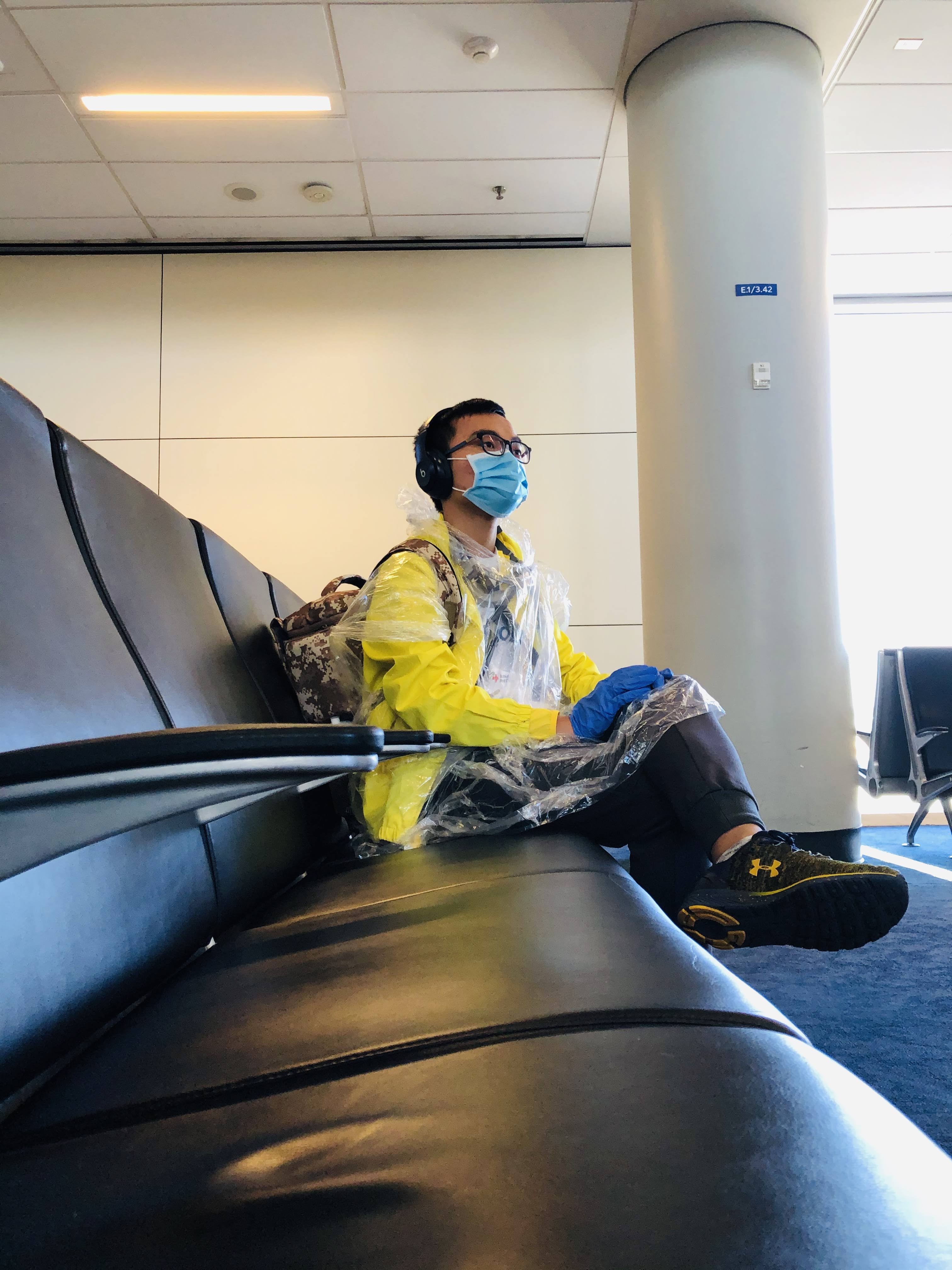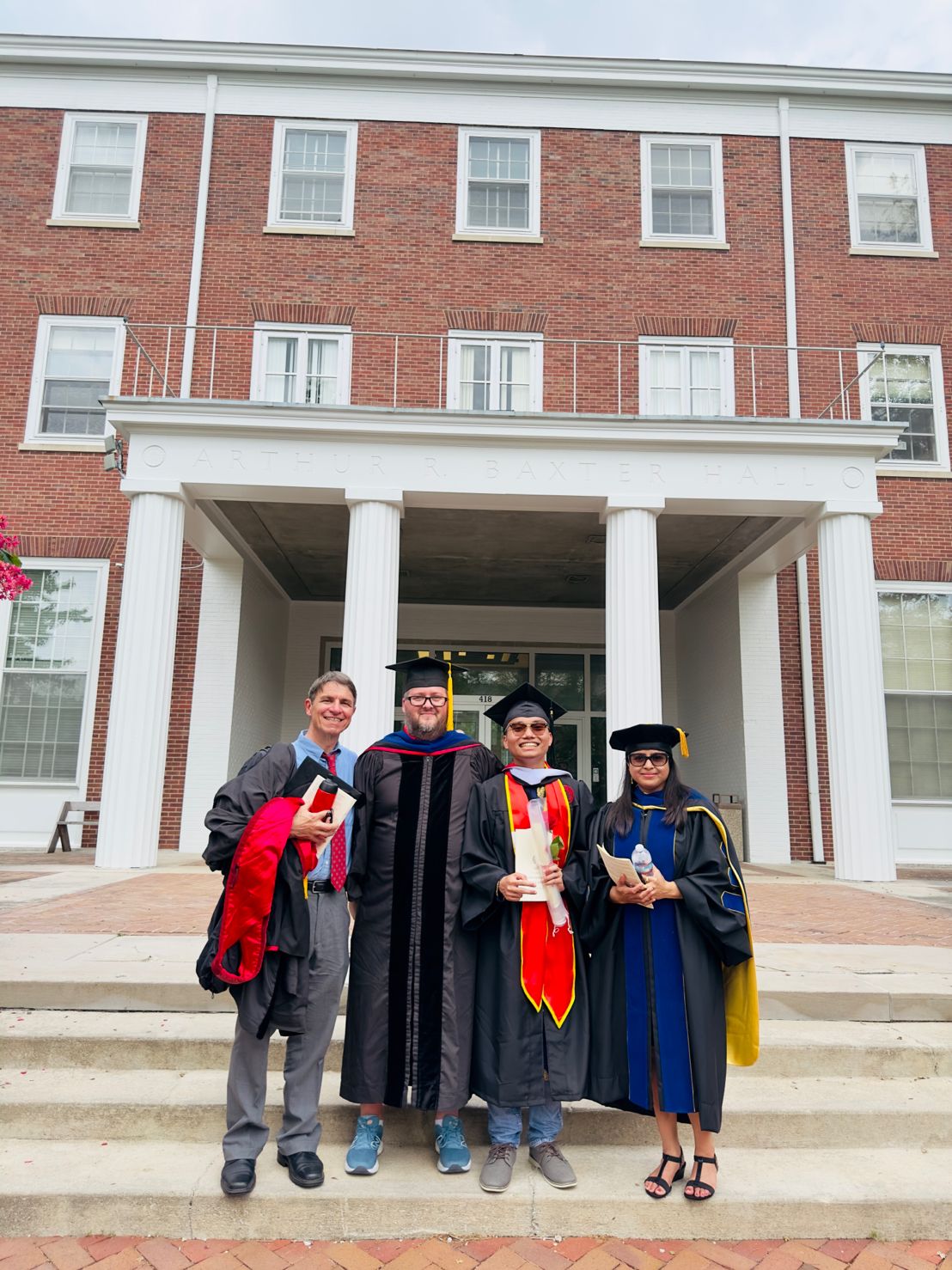Wabash won’t be easy, but it will be worth it.
It’s a phrase that many students are sure to hear repeated throughout their four years at the College.
And it’s one that Khoi Truong ’23 (Vietnamese: Truong Minh Khôi) had to remind himself repeatedly as the COVID-19 pandemic kept him away from campus for nearly half of his tenure at Wabash.
Like most students during the spring of 2020, Truong, an economics major and business and computer science double minor from Vietnam, was instructed to return home and continue his studies remotely.
He recalled the scramble of traveling during lockdown.
“Every flight and airport were so crowded. The best way I could protect myself was to wear the closest thing to medical gear as possible,” Truong said while showing a photo of himself sitting in an airport, masked in personal protective equipment from head to toe.
With a special visa and no direct fight home, Truong flew from Indianapolis to Dallas to Tokyo and finally to Vietnam, where he was then taken to an isolation facility.
“When I finally made it home, Vietnam was already locked down, and everyone was asked to stay home,” he continued. “Universities were turned into military camps managed by doctors and nurses.”
Truong spent 21 days at the National University dormitory in Ho Chi Minh City. Under the World Health Organization guidelines, everyone was required to stay at the facility for at least 14 days and undergo COVID testing every seven days.
While in isolation, and later when he was able to return home to family, Truong never disconnected from Wabash, even with a 12-hour time difference.

“My bio clock was on U.S. time, but I was living in another time,” he said. “Having to manage both at the same time was really challenging.”
Even with the stress and uncertainty of the pandemic, Truong concentrated on his studies and kept an optimistic attitude. He focused on why he chose Wabash in the first place, and used his post-graduation goals as his motivation.
“Wabash presented me with opportunity. One of my ambitions as a kid, and still now, is to find a way to bring more technological progress to my country,” Khoi explained, noting that some advances we might take for granted in the U.S. — like language-accessible internet services — are not customary in all parts of Vietnam.
“There are lot of barriers to access to technological knowledge, and I want to help break some of those down for future generations. I want to be a part of businesses — new startups or firms focused on tech innovations — that ultimately helps move Vietnam toward a modern market economy,” he continued. “The way to do that is to pursue higher education.”
Truong carried that with him as he remained in Vietnam and continued his studies at Wabash virtually.
Economics Professor Sujata Saha recalls being impressed by Truong when she taught him via Zoom.
“Khoi was always on point and prepared with everything we were doing. He was never late arriving to class, and doing so from different time zones was really commendable,” she said. “If there was something he didn’t understand, he would speak up and share his concerns with me. He did a good job of advocating for himself.”
Saha, who Truong also worked under as a research intern, said she was proud of the growth she saw in him especially after his return to campus his junior year.
“With maturity and exposure to education, his way of approaching problem-solving changed,” Saha said. “His attitude toward dealing with challenging situations became more positive. He grew more confident in his abilities to evaluate academic and personal problems and find solutions, rather than letting adversity bring him down.”
Truong credits his professors, including Saha and Economics Professor Eric Dunaway, for helping keep him on track toward graduation.
“It has not been without struggle and growth. And that is probably the most important thing, learning to get back up,” said Dunaway, Truong’s academic advisor. “That resiliency has made Khoi stronger, and will help him for years to come.”
Truong wrapped up his tenure at Wabash with many accomplishments.
The former secretary of the International Student Association earned distinction in comps, and received the Benjamin A. Rogge Memorial Award and the Robert Wedgeworth Library Research, Scholarship, and Creativity Award.
“Earning those awards made me feel proud and like all the hard work I put in over the last four years was recognized,” said Truong, who graduated summa cum laude and is now pursuing a master’s degree in applied economics and management at Cornell University. His studies focus on computational methods and machine learning in business, economics, and management.
“I am grateful for all the wonderful support, encouragement, and guidance of my professors, advisors, peers, and family that have made it all possible.”